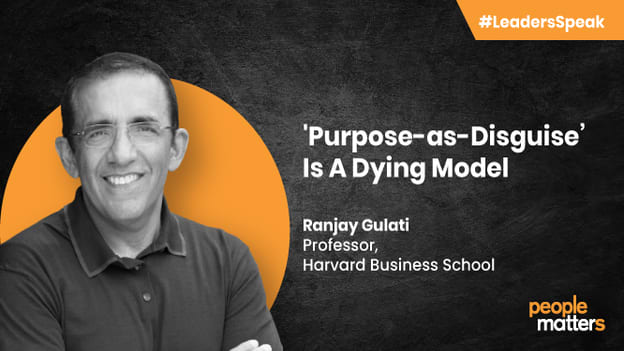Leaders must be both plumbers and poets: Harvard Prof Ranjay Gulati

Ranjay Gulati is a professor at Harvard Business School and an expert on leadership, strategy and organisational growth. Until recently, he chaired the Advanced Management Program, the school’s flagship senior leader executive program. He has authored seven books, including “Deep Purpose: The Heart and Soul of High-Performance Companies”. In an exclusive interview with People Matters, Gulati said that practising deep purpose improves financial performance, besides resulting in societal good. He observed that companies are guilty of “purpose-as-disguise” when they use a noble-sounding purpose to cover up immoral or even criminal activity. Edited excerpts:
How is purpose different from the so-called “mission”, “vision,” and “values”? Has not "purpose" been the driving force for businesses, traditionally?
Purpose and mission are essentially the same thing. But the word “mission” has become watered down because of mission statements, which for the most part have devolved into meaningless PR exercises that add little real value. Today, the word purpose conveys greater moral heft.
Most businesses have not traditionally used the idea of purpose in the way that I am advocating – as a prism through which to view both long-term strategy and day-to-day operations.
Purpose is distinct from vision, which sets out goals and a measurable set of targets that an organisation seeks to accomplish. And it is not the same as values, which are unchanging principles of behaviour, such as “we will do no harm” and “we will nurture creativity.” Purpose, operating in tandem with values and vision, defines the very reason that an organisation exists.
Why is it time to go deep on purpose when some of the most successful companies are openly embracing “purpose-as-disguise” model?
Companies are guilty of “purpose-as-disguise” when they use a noble-sounding purpose to cover up immoral or even criminal activity. This is a dying model, and it is no longer tenable in today’s world. If customers aren’t at first aware of purpose-in-disguise, employees will blow the whistle on it, and a company will suffer reputational, financial and/or legal consequences. Just look at Theranos.
Leaders who believe in purpose in disguise have a cynical view of business that ultimately backfires. I have found that practising deep purpose actually improves financial performance, in addition to resulting in societal good. It is a generative force on many levels.
Are you suggesting there’s a need to have scrutiny on the purpose quotient of companies?
Absolutely, and it’s already happening. Investors and customers are demanding that companies commit to such environmental goals as achieving net-zero emissions by 2050. And the scrutiny is going beyond the environment and sustainability to include social issues. More companies are being required to take a stand on social and political developments. The war in Ukraine is the most recent example. Without a well-formed purpose, a company could find itself floundering in response to outside social and political pressures.
But, there is no ‘how-to’ playbook for a large number of companies that want to double down on their purpose?
Leaders need to start by detecting or discovering their purpose, and then crafting a purpose statement. But that’s just the beginning. From there they must look at every aspect of their organisation through the lens of purpose and make changes that balance the needs of multiple stakeholders, including customers, employers, suppliers, investors and society at large.
What should the archetype of a new ‘leadership’ look like in the post-pandemic world where workers and employers are looking for meaning, purpose, and resilience?
As I point out in my book, leaders must be both plumbers and poets. Of course, they need to make sure their organisation is operationally and financially sound. That’s the plumbing part. But beyond that, they must communicate a compelling narrative around the purpose of their company – one that inspires employees to perform above and beyond their job descriptions, and instils loyalty and commitment among multiple stakeholders.
How do you see the new world of work where hybrid work, the Great Attrition remain top of mind for leaders?
The pandemic led to deep introspection and a loss of connection for many workers. People started to quit when they realised that they needed more out of their work. Many companies have responded by paying people more, but that’s not enough. They also need to actively align their overarching purpose with the personal purpose of their employees. For many people, a job needs to be more than just a contract; it also needs to provide meaning in their lives.
What’s your advice to companies that use purpose as a lever to hide their wicked intentions?
Beware, your time is running out!
Also Read...
Leaders must ask themselves –‘Am I growing?’: Whitney Johnson






